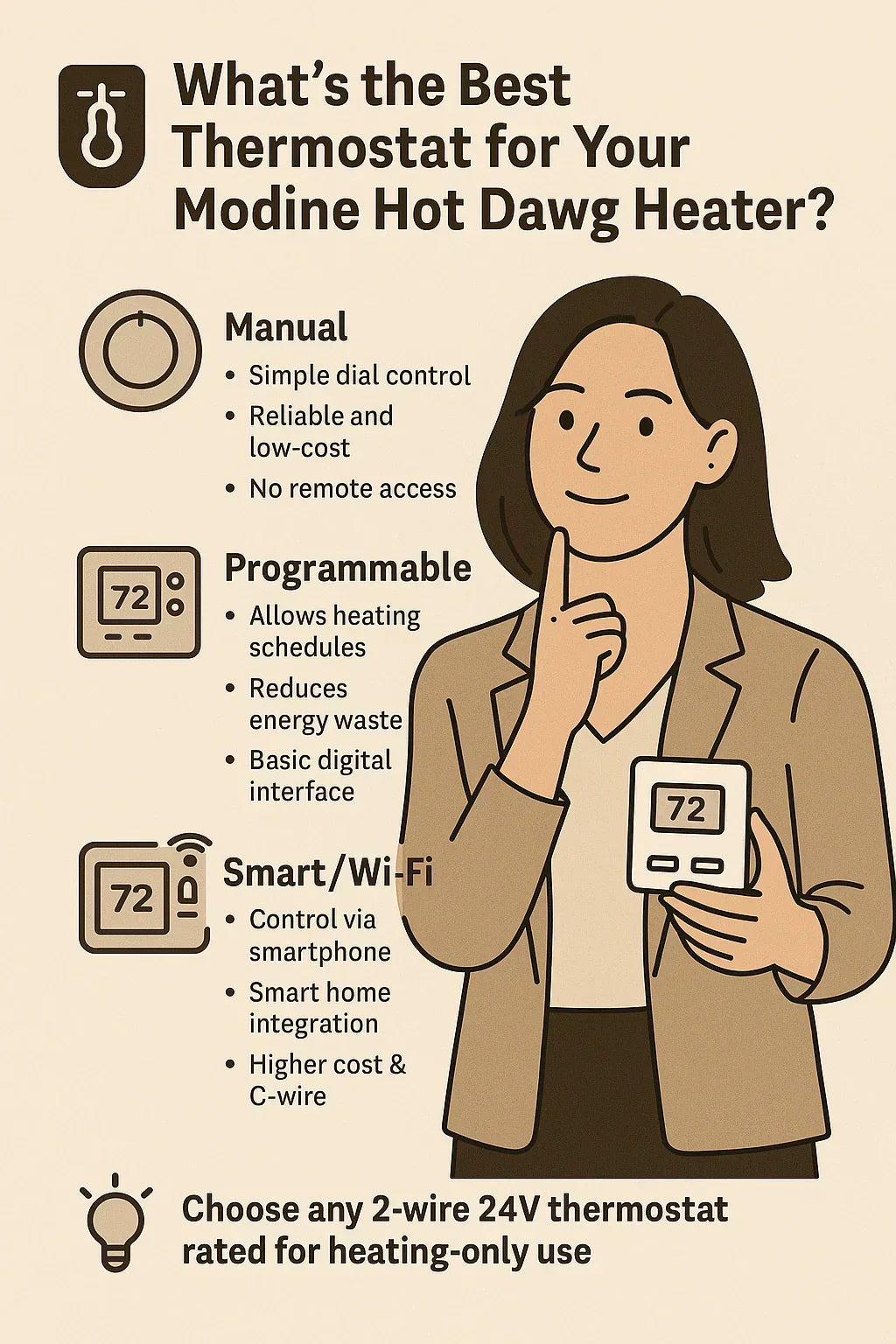Audience: Savvy homeowners seeking the ideal thermostat for comfort, efficiency, and compatibility with their Modine Hot Dawg unit heater.
🔍 Introduction: Why Thermostat Choice Matters
The Modine Hot Dawg is a powerful and efficient heater—but without the right thermostat, it may:
-
Short-cycle unnecessarily
-
Run longer than needed
-
Waste fuel and money
-
Deliver uneven heat
This guide walks you through:
-
Thermostat types compatible with the Hot Dawg
-
Pros and cons of manual vs programmable vs Wi-Fi
-
Top thermostat picks for garages, shops, and sheds
-
Wiring tips and accessories
🔌 Modine Thermostat Basics
Modine Hot Dawg heaters use:
-
Low-voltage (24V) two-wire thermostat control (R and W)
-
Single-stage heating (no multi-stage support)
-
Compatible with standard HVAC thermostats, both digital and analog
📎 Modine Hot Dawg Owner's Manual (PDF)
🔧 Thermostat Requirements for the Hot Dawg
| Feature | Required? |
|---|---|
| 24V compatibility | ✅ Yes |
| Heating only | ✅ Yes |
| Fan control | ❌ No (Hot Dawg controls fan internally) |
| Wi-Fi or Smart Home | Optional |
| External power (C-wire) | ❌ Not required for basic 2-wire models |
🧰 Three Types of Thermostats That Work with Modine
1. 🕹️ Manual Thermostats (Non-Programmable)
Simple, inexpensive, and highly reliable.
Top Picks:
-
Honeywell CT87N
-
Emerson 1E30N-910
Pros:
-
Easy to install
-
No batteries or Wi-Fi required
-
Ideal for infrequently used garages
Cons:
-
No scheduling
-
No remote access
💵 Price Range: $25–$40
2. 📅 Programmable Thermostats
Set schedules to match your routine—reduce runtime, save energy.
Top Picks:
-
Honeywell RTH2300B
-
Emerson 1F83C-11NP
Pros:
-
Customizable heat cycles
-
Great for daily garage or shop use
-
Can reduce fuel costs by 10–15%
Cons:
-
Limited remote features
-
Slightly more complex setup
💵 Price Range: $35–$70
📎 Energy.gov Programmable Thermostat Tips
3. 📱 Wi-Fi & Smart Thermostats
Control your Hot Dawg from your phone or smart home assistant.
Top Picks:
-
Honeywell Home T9
-
Emerson Sensi Wi-Fi
-
Lux Geo
Pros:
-
Remote access from anywhere
-
Smart scheduling and learning modes
-
Voice control via Alexa or Google
Cons:
-
Requires Wi-Fi signal in garage
-
Most models require C-wire or power adapter
💵 Price Range: $80–$180
📎 ENERGY STAR Smart Thermostat Directory
🧠 Do You Need a C-Wire (Common Wire)?
Most 2-wire thermostats don’t require a C-wire, but many smart thermostats do. If your Hot Dawg only has R and W terminals, and no C-wire:
-
✅ Use a battery-powered programmable thermostat
-
✅ Add a 24V adapter or C-wire add-on kit for smart models
🔌 Wiring Your Modine Thermostat
Typical 2-wire connection:
-
R (power)
-
W (heat call)
Diagram:
❗ Do not connect to Y (cooling), G (fan), or C unless specifically advised.
📎 SupplyHouse Wiring Instructions
📊 Thermostat Feature Comparison Table
| Feature | Manual | Programmable | Smart/Wi-Fi |
|---|---|---|---|
| 24V Compatible | ✅ | ✅ | ✅ |
| Scheduling | ❌ | ✅ | ✅ |
| Remote Control | ❌ | ❌ | ✅ |
| App Integration | ❌ | ❌ | ✅ |
| Easy to Install | ✅ | ✅ | ⚠️ (C-wire may be needed) |
| Price | 💲 | 💲💲 | 💲💲💲 |
🧾 Best Thermostat for Your Use Case
| Use Case | Best Thermostat |
|---|---|
| Weekend-only garage | Honeywell CT87N (manual) |
| Daily workshop | Honeywell RTH2300B (programmable) |
| Remote control & automation | Emerson Sensi Wi-Fi or Honeywell T9 |
| No C-wire + need scheduling | Lux Geo (battery powered) |
💡 Energy-Saving Tips
-
Set thermostat to 50–55°F when not in use
-
Use the “Auto” mode instead of always “On”
-
Add a remote sensor (available with T9) for more precise heating
-
Disable recovery mode if it pre-heats your space too early
📎 Smart Thermostat Optimization – ENERGY STAR
🔚 Conclusion: Smart Control, Smarter Comfort
Choosing the best thermostat for your Modine Hot Dawg 75,000 BTU heater can optimize comfort and save hundreds on energy bills.
-
Want simple? Go manual
-
Want set-and-forget? Choose programmable
-
Want smart control? Go Wi-Fi
Just make sure it’s 24V compatible and rated for heating-only 2-wire systems—and you’re set for a warm, efficient winter.
In the next topic we will read about: Garage Heater Venting 101: What You Need to Know About Horizontal & Vertical Options







